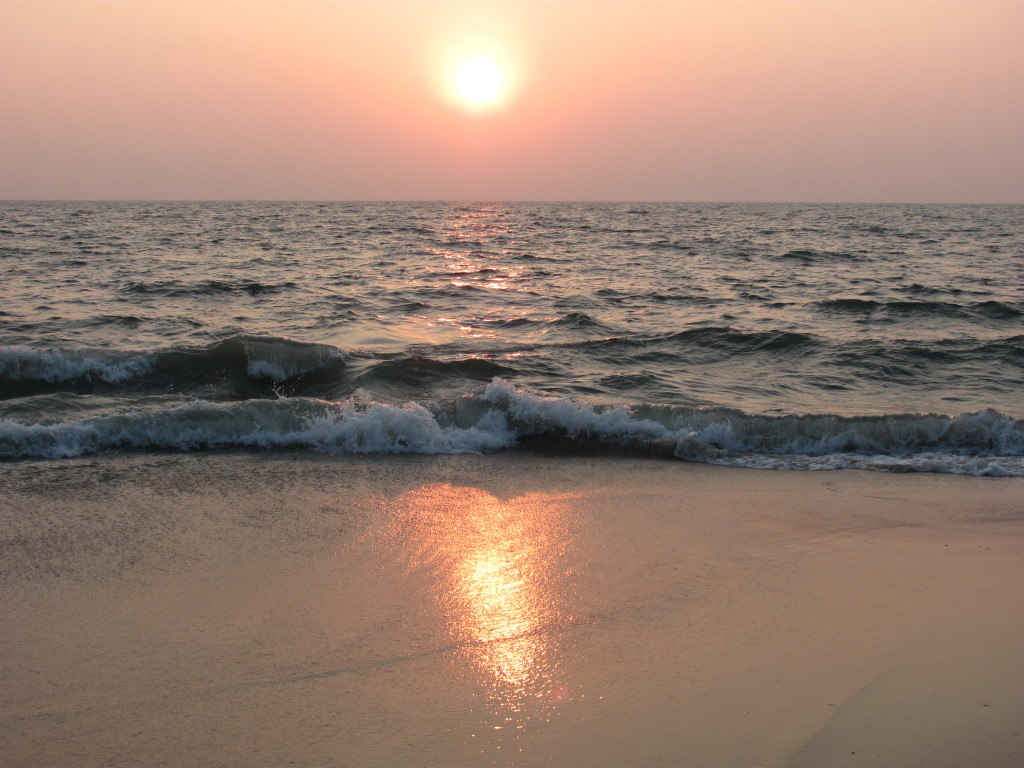
I was north of San Francisco with a group of family members, traveling along Highway 1. Every once in a while, along this beautiful, twisting road, you find pullovers or side roads that lead to a small beach nestled in the cliffs.
We stopped at one of these and walked down to the sand. As you approach the water, the beach dropped in a steep shelf, and small Pacific rollers plopped on the beach and sagged back into the sea.
For those who could see a lot better than me, there was a sign on the edge of the parking lot that said something like “beware of sleeper waves,” along with a scary description and the annual death toll.
On any beach, I am compelled to dip my foot into the water. I try for just the sole of my shoe, but usually end up with a wet foot — this is all part of the experience. The family members stood around on the high, level part of the beach, while I scrambled down the steep drop to the actual water. I soaked my foot and then turned to look at my family. They were staring hard out to sea, and then they turned and ran. I turned around just in time to be engulfed by a huge swell that immediately knocked me flat. I tried to scramble out of the water, but the sand just disappeared under my feet, and when the wave started to recede, it pulled on me like an enormous cold vacuum cleaner. I was amazed at the power. I managed not to get sucked out and crawled onto the dry beach soaked to the skin from head to foot.
If I hadn’t dragged myself out of the water, here’s what I think would’ve happened. I read later that these sleeper waves are caused by a strong Pacific current that runs right off the beach. The sleeper wave is a kind of impulse that breaks off the current. It wasn’t a big crashing tsunami. It was a big bump of water, like a flexed muscle. People get swallowed by these and are never seen again. So, if it had dragged me out, out toward the strong Pacific current, I don’t think it would have been a quick process. In fact, I think I would’ve had time to interact with people on the shore.
“I’m being dragged out to sea,” I say to the people on the beach as I drift away.
“Don’t fight it,” someone would say. “You’ll only make it worse.”
“Okay,” I’d say. “Well, I guess this is goodbye everybody.”
They wave and say goodbye.
Then there would be an awkward silence as I continue to drift. To fill the silence, someone in my family would say something like “I see a great white shark coming your way! Just kidding!”
“Very funny,” I would yell back. I’m yelling now because the distance is widening. “Hey,” I’d yell, “Joe can have my Martin guitar as long as he takes care of it.”
“Sounds good,” they yell back. “Well, we’re off to get some lunch. Hope it all goes as well as possible for you.”
“Thanks,” I’d yell, and then I’d turn my head toward Japan and watch for sharks.
This is like degenerating. If you have a degenerative disease, there’s not much anyone can do for you. We all know medical science struggles to defeat even a simple cold virus. But it is even more helpless against any condition that leads to degeneration, especially in nerve tissue. When you have an eye condition like mine, or ALS, or any of a host of progressive, degenerative diseases, it’s a long, slow loss.
Whether you lose vision or muscle control or whatever else, it’s a long goodbye, as you lose function, maybe plateau for a while, lose more function, maybe gain a little something through some treatment or accommodation technology, and then slip again. The sand slowly disappears under your feet and the sleeper wave grabs you by the ankles and pulls.
After the so crushing blow of the diagnosis, the rest is patience. Those close to you hardly know what to do with you. They have trouble telling what you can do and what you can’t do. They don’t know when to help or when to leave you on your own. The progression is baffling, confusing.
And then you hit some tipping point, when you are noticeably worse, where actions that were routine not too long ago now pose a major challenge. You wave goodbye to that lost functionality, tell it that you’ll miss it. But the lost functionality is gone, like an ancestor. It becomes vague, indistinct, but somehow still connected to you.
And then maybe, just maybe, as you are ready to turn your head toward Japan or maybe hope for a shark, the wave spits you back onto the shore. It’s a miracle, or a stem cell treatment, or a missed diagnosis, or the end of a bad dream. Your lost functionality is waiting for you on the beach.
“Hi there,” you say, “it’s nice to see you. It was getting kind of lonely out there.
Copyright 2015 by Craig J. Hansen